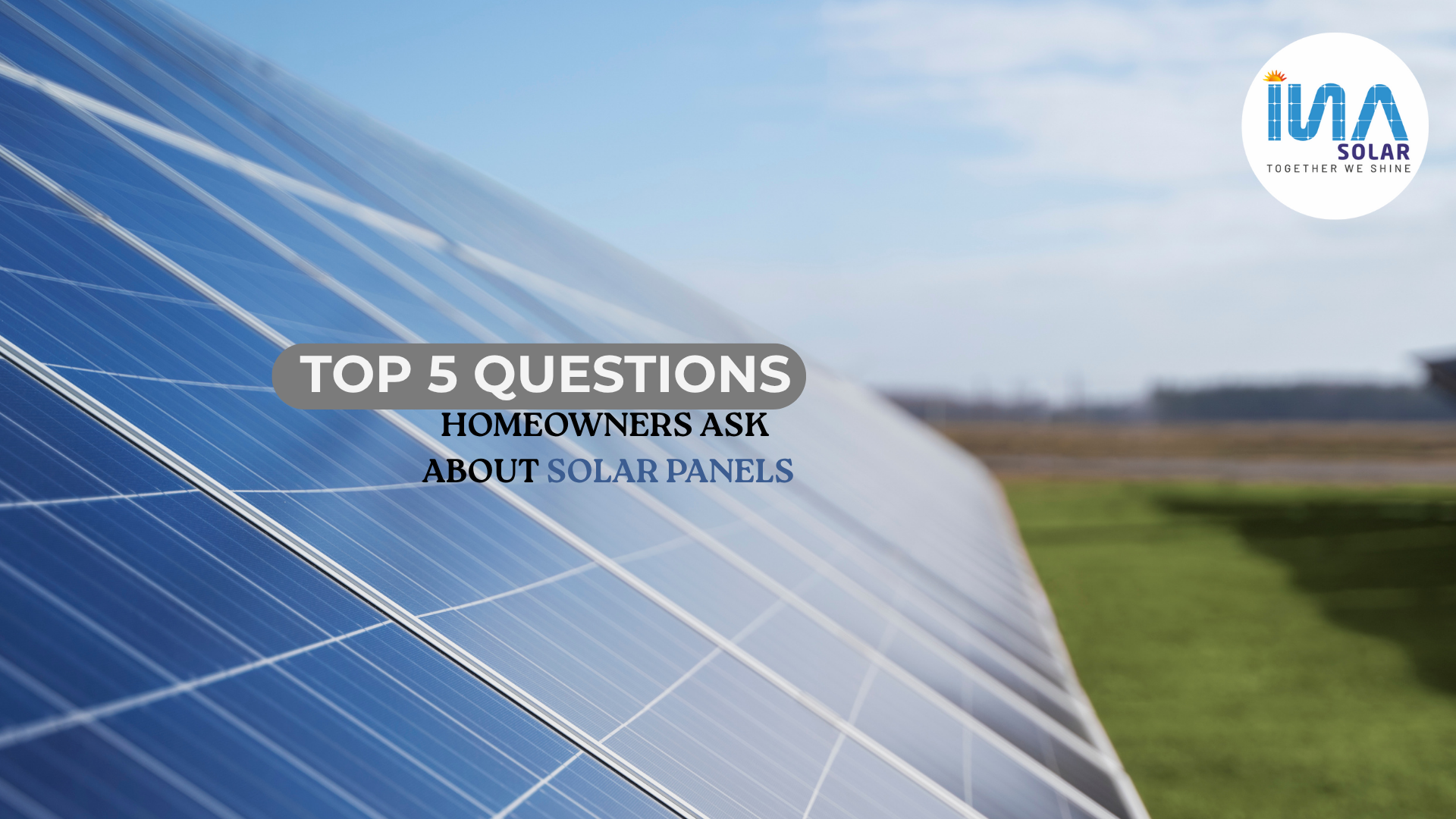Sales Enquiries
+91 7240 444 666Blogs
Sales Enquiries
+91 7240 444 666Blogs
Top 5 Questions Homeowners Ask About Solar Panels

For homes of all kinds, solar panels from the top solar panel company in India represent a bold statement of sustainability and a future-oriented choice that transcends mere fad. Every morning, the golden dawn brings with it power, freedom, and less expensive energy costs. Despite this solar curiosity, many homeowners are confused. They have so many questions in mind, including:
● The investment—worth it?
● Will it save money?
● What if it rains all week?
These doubts are serious and need honest, realistic clarifications. Moving to solar seems like a leap into the unknown for many. It's about changing how one lives, pays for energy, and thinks about the environment, not simply putting panels. Naturally, such a transition requires prudence.
Good concern. Solar panels from the best solar panels manufacturers in India are an investment in your energy future, not merely a roof addition. Solar systems and bespoke solutions have varied pricing. This varies depending on system size, panel performance, and installation conditions. The sticker price is only one portion. The total cost depends on several things.
● Sunnier locations generate more power even with fewer panels
● Panel type, roof angle, and local labor also affect the cost.
The initial investment may be robust, but worth investing. Solar panels save energy expenses. They boost house value while preventing rising monthly expenditures.
Tax credits, subsidies, and other government incentives cut prices elsewhere. Though expensive, it empowers—a sensible step towards heat independence.
Thankfully, the answer is yes—month after month. After installation, solar panels from the best solar panels company in India quietly turn sunlight into energy, lowering grid power use. Over time, this reduces utility expenses significantly. Sunlight may save power expenditures by 50% or more in sunny areas. Your grid payment is already in your pocket.
The payback time is more important than monthly savings. It takes this long for your solar system to "earn back" its cost in lower costs. Your energy gets liberated after 5–7 years. Net metering lets you sell excess power to the grid, a great benefit. You may physically rotate your meter backward to get credit for surplus energy.
On a rainy day, the sky gets silvery and drops race down the windowpane. One must wonder, "What now?" Do my solar panels take the day off? Not exactly! Solar power doesn't need a clear sky. Since solar panels collect light, not heat, diffused sunlight still seeps through clouds on rainy days, quietly powering your system. While output may drop during storms or thick cloud cover, panels get slower but don’t sleep.
Energy storage and the grid are solar resilience's hidden heroes. Batteries store surplus electricity from bright days for cloudy ones. Your house effortlessly absorbs electricity from the grid without batteries, keeping the lights on and life going. Over the years, this ebb and flow has balanced well. A week of rain may lower productivity, but the sunny months make up for it.
Solar energy adapts, not breaks. It can ride out the clouds and capture the sun again like a seasoned sailor in shifting breezes. You, the homeowner, stay calm, prepared, and moving ahead.
A symphony sounds best when all notes are in tune, which requires perfect angles, orientation, and illumination. Your roof should face south (northern hemisphere) or north (southern hemisphere) and be slanted to let in early light. A sturdy, clear, unshaded roof is excellent.
Sadly, most roofs are not good for the installation of the panels from the top solar panel company in India. The leaves of trees make shadows. Skylights and chimneys get in the way. Some rooftops face east or west and slope in strange ways. None of this is against the law.
This is when a professional site evaluation comes in handy. Evaluators are certified solar inspectors. They use sophisticated tools to map the roof's structure, how much solar it gets, and any shading obstacles. Roof not ready for solar? Choose one. Homeowners may gather light without roofs by using solar carports, ground-mounted panels, and communal solar projects.
Being appropriate is being able to do something, not being flawless. Almost any house may become a solar home with the correct leadership.
Solar panels from the top solar panel company in India may last 20–25 years. They've been friends for decades, yet they lose strength each year. Due to manufacturers' warranties and performance guarantees, homeowners may expect solar panels to run at 80–90% capacity after 20 years. It is a dependability contract, not just a product.
Solar panels need minimal care. They lack concealed motors or parts. A quick wash and periodic dust, leaf, and bird dropping inspections are generally required. Pollen, snow, and trash-filled regions may require a professional cleaning once or twice a year. Potent solar panels are trustworthy. They gently soak up the sun on your roof year after year, giving you a lot for free.
These 5 questions are guidelines infused with clarity, inquiry, and sunlight. With any major investment, knowledge is key. Confidently consult solar experts and follow their advice. Overall, solar is about pursuing your own path, not following a trend. Decision-making is easy and bright with the right information, and solar solutions from the top solar panel company in India.
Fill the form, we will get in touch with you or contact us at below details.